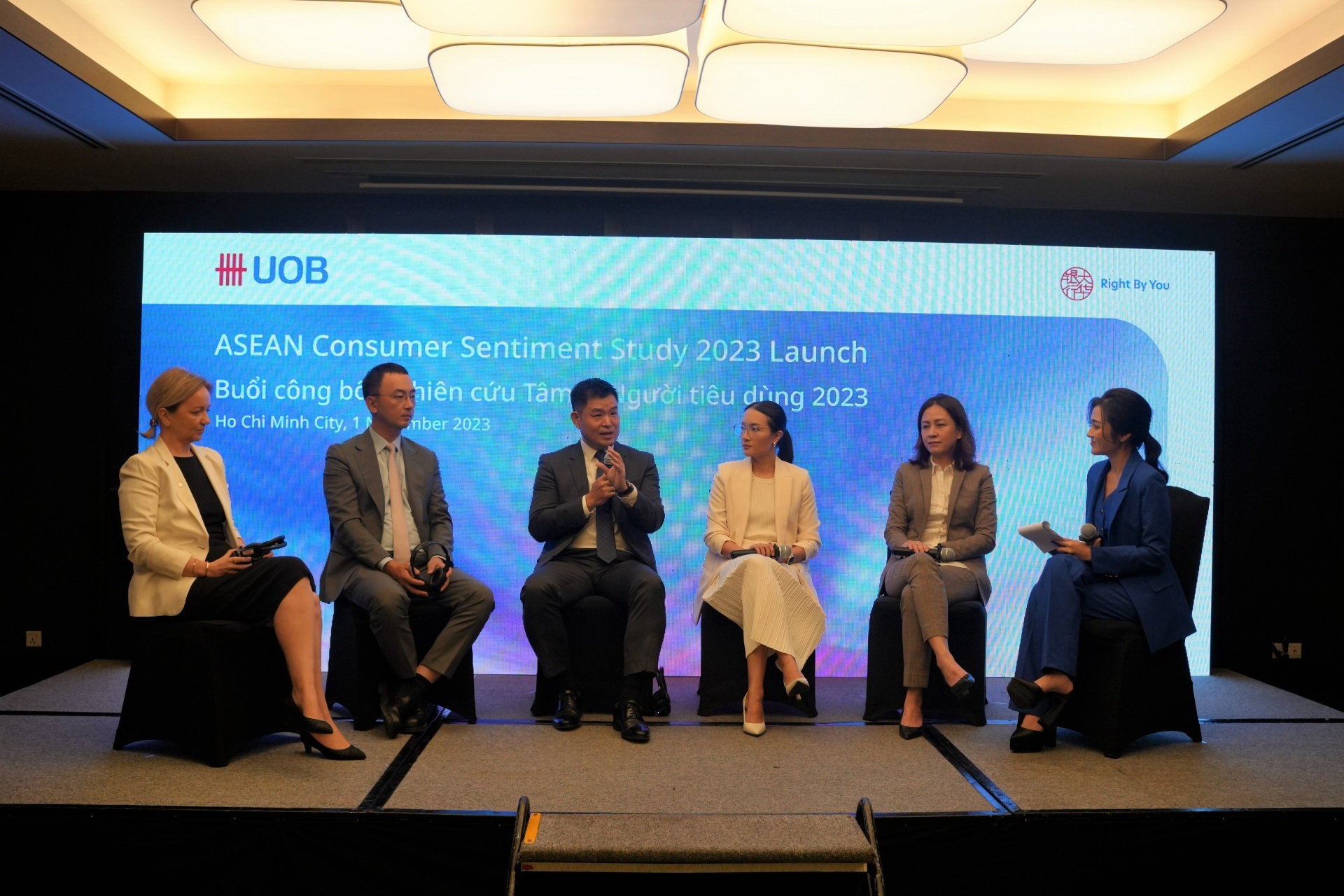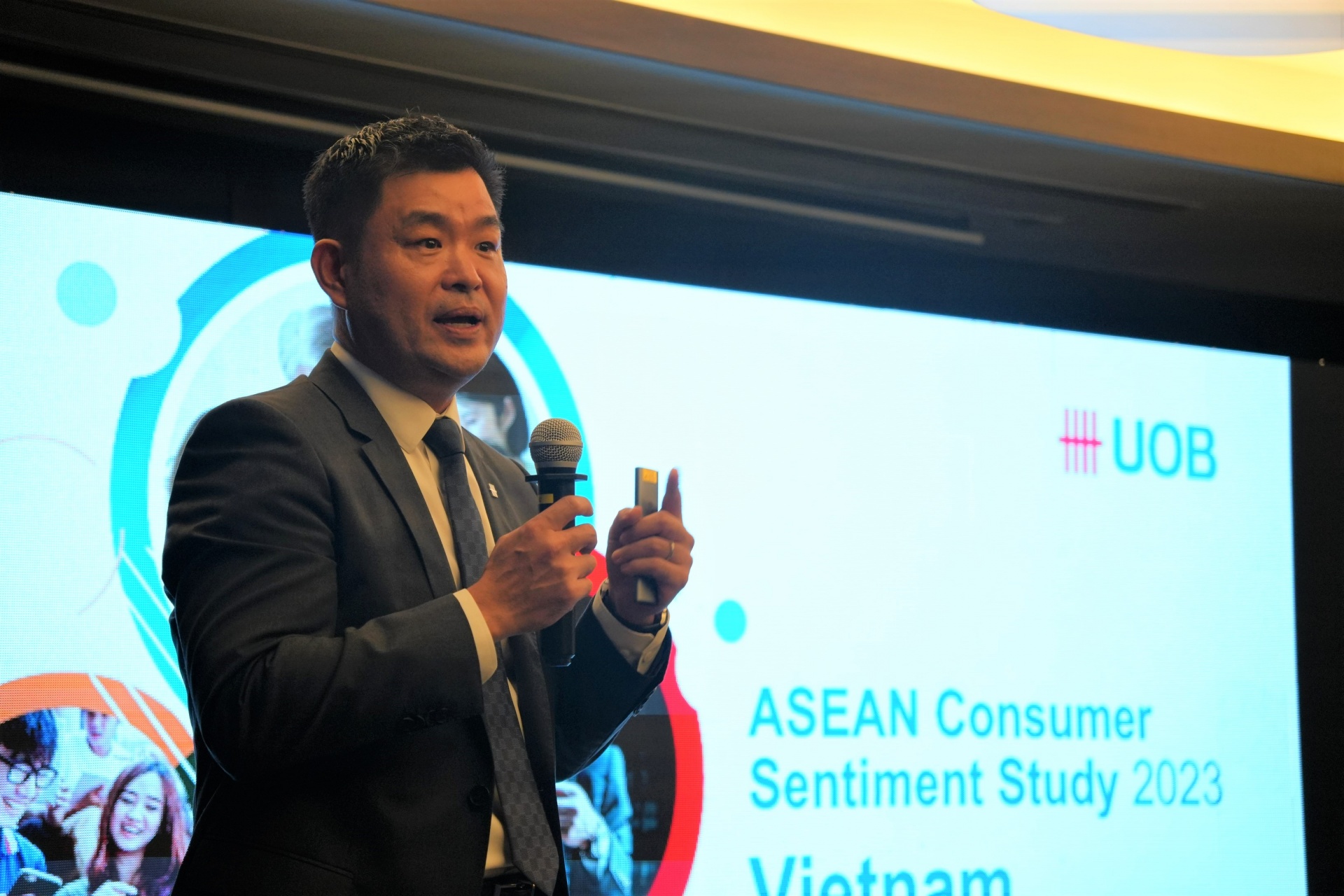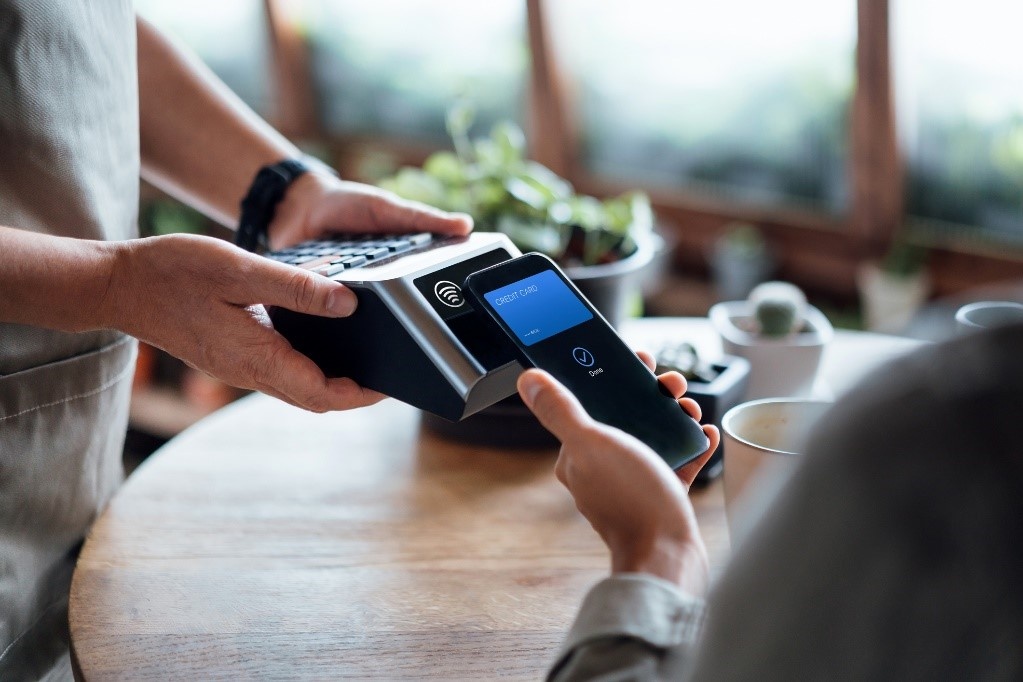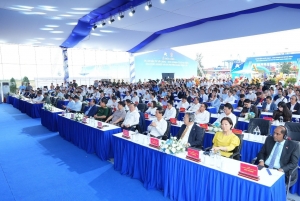UOB releases flagship study on consumer sentiment
The study (ACSS) has found that Vietnamese consumers are more optimistic compared to those in Singapore, Malaysia, Thailand, and Indonesia, but remain concerned about rising inflation.
 |
| The ACSS release on November 1 in Ho Chi Minh City |
Accordingly, more than three quarters of respondents in Vietnam expect themselves to be financially better off by June next year. This is despite rising inflation and increased expenses fuelling fears of an economic downturn, with about 75 per cent expecting this to happen in Vietnam within the next 6-12 months.
This downcast sentiment has increased compared to last year across all the surveyed age and income groups.
The preference to adopt digital banking and payment channels continues to trend strongly. Consumers are favouring mobile banking apps, and newer digital payment modes like e-wallets, QR code-based payments, e-commerce payment platforms, and mobile wallet debit or credit cards.
Paul Kim, head of Personal Financial Service at UOB Vietnam said, "The strong economic growth in Vietnam has given the nation's consumers more optimism about their financial wellbeing when compared to their regional counterparts. While they are concerned about the high inflation, we are encouraged by their continued enthusiasm to embrace a new era of digitalisation."
“As a financial institution, the study's findings and insights regarding consumer priorities, savings habits, financial behaviours, and digital preferences are invaluable. This allows us to understand our customers better and tailor our services to their needs as we enhance our engagement efforts. We will continue to support our customers as they navigate the evolving banking and digital landscape, helping them to seize opportunities and pursue their financial aspirations.”
 |
| Paul Kim, head of Personal Financial Service at UOB Vietnam |
Optimistic about the future, though financial concerns remain
Despite concerns about an economic downturn, Vietnamese consumers are more positive about the future environment than their counterparts in the region.
76 per cent of respondents in Vietnam expect themselves to be financially better off by June next year, followed by Indonesia at 74 per cent and Thailand at 68 per cent.
Rising inflation is the top concern in ASEAN, echoed by 62 per cent of respondents, while 57 per cent worry about increasing household expenses.
Compared to the region, the proportion of respondents in Vietnam voicing concerns in these two areas is also higher at 66 per cent and 62 per cent, respectively.
| When it comes to financial planning, UOB emphasises the importance of a long-term and risk-first approach, prioritising protection over investment. |
80 per cent of consumers in Vietnam are concerned about their finances. The top three issues are the ability to save money (32 per cent), the ability to maintain their current lifestyle (32 per cent), and the ability to take care of their parents’ financial and healthcare needs (30 per cent).
As such, consumers are more conservative with their finances and investments, with 65 per cent tracking their spending and money more closely via an online banking platform, and 60 per cent doing more research into products that offer deals, rewards, or savings.
Financial preferences are also shifting as consumers allocate more money into low-risk instruments like bank fixed deposits (32 per cent) and insurance plans (28 per cent).
25 per cent of respondents in Vietnam are allocating more money to insurance compared to last year, which is four percentage points higher than the regional average, especially among affluent consumers (36 per cent).
When it comes to financial planning, UOB emphasises the importance of a long-term and risk-first approach, prioritising protection over investment.
With a comprehensive suite of solutions and products including savings, investment, and protection options, the bank aims to empower individuals with the option to construct a resilient financial plan that is capable of weathering any economic cycles.
Rising interest in sustainable investment
Three out of every five consumers in Vietnam are interested in finding out more about sustainable investments.
40 per cent of respondents said they have included sustainable investments in their portfolio, and 58 per cent will consider making a sustainable investment if it matches their risk appetite.
90 per cent of consumers said that these help meet the dual goals of achieving financial returns while also doing their bit for the environment.
Since May, UOB Vietnam has been in a strategic partnership with UOB Asset Management Vietnam to offer innovative and sustainable investment solutions. UOB customers have access to the United Vietnam Environment, Social and Governance (ESG) Equity Fund managed by UOBAM Vietnam, which focuses on investing in stocks with strong fundamentals, good growth potential, and high ESG ratings.
Stronger adoption of digital banking channels and payment methods
 |
As consumers in Vietnam become more digitally savvy, mobile banking apps have seen a spike in usage, with 54 per cent of respondents increasing their use of this channel over the past year.
More than half of the respondents preferred using online tools to transfer money overseas and check the status of rewards.
For more complex situations, such high-value transactions, applying for or refinancing bank loans, and purchasing insurance, consumers still value traditional methods or a combination of banking channels.
UOB’s omnichannel approach where the bank offers a seamless online-to-offline engagement model reflects the banking preferences of consumers in Vietnam.
In the payments space, Vietnamese consumers have shown to be keen adopters of the latest technologies. Four fifths of consumers in Vietnam use e-wallets at least once a week, and the same proportion is likely to recommend them to others. Momo is the most popular e-wallet, followed by ZaloPay and VNPay.
UOB continues to invest in innovative digital banking solutions and is partnering with leading digital payment platforms to cater to the evolving needs of its customers.
In its fourth year, ACSS is UOB’s regional flagship study analysing consumer trends and sentiments in Singapore, Malaysia, Thailand, Indonesia, and Vietnam. The study was conducted from June 1 to June 26, and surveyed 3,400 respondents online across the five countries – including 600 in Vietnam.
This is the first time UOB has partnered with the global management consulting firm Boston Consulting Group for the study.
 | Flagship non-tariff, logistics, and industrial zone project kicks-off in Haiphong On May 13, Haiphong People's Committee and Xuan Cau-Lach Huyen Investment JSC held the groundbreaking ceremony for the Lach Huyen non-tariff, logistics, and industrial zone project. |
 | UOB empowers Vietnamese SMEs to harness digital technologies UOB FinLab, an innovation accelerator, announced its official launch in Vietnam today, granting small- and- medium- sized enterprises access to digitalisation and sustainability programmes, matching of business solutions providers, mentorship, and valuable resources. |
 | Positive offsets found amid downbeat sentiment Vietnam’s export landscape continues to regain momentum on account of gradually recovering demands, but risks are still looming. |
What the stars mean:
★ Poor ★ ★ Promising ★★★ Good ★★★★ Very good ★★★★★ Exceptional
Related Contents
Latest News
More News
- Banking sector targets double-digit growth (February 23, 2026 | 09:00)
- Private capital funds as cornerstone of IFC plans (February 20, 2026 | 14:38)
- Priorities for building credibility and momentum within Vietnamese IFCs (February 20, 2026 | 14:29)
- How Hong Kong can bridge critical financial centre gaps (February 20, 2026 | 14:22)
- All global experiences useful for Vietnam’s international financial hub (February 20, 2026 | 14:16)
- Raised ties reaffirm strategic trust (February 20, 2026 | 14:06)
- Sustained growth can translate into income gains (February 19, 2026 | 18:55)
- The vision to maintain a stable monetary policy (February 19, 2026 | 08:50)
- Banking sector faces data governance hurdles in AI transition (February 19, 2026 | 08:00)
- AI leading to shift in banking roles (February 18, 2026 | 19:54)

 Tag:
Tag:


























 Mobile Version
Mobile Version